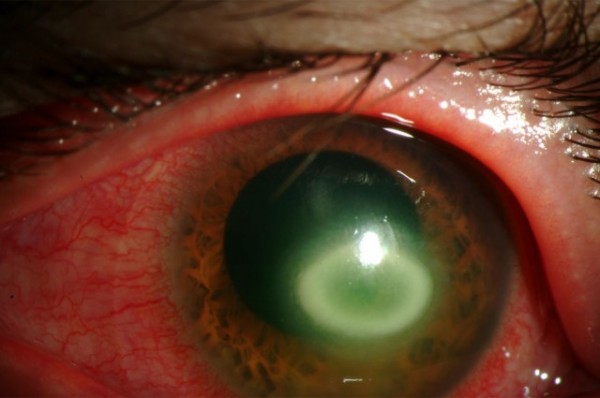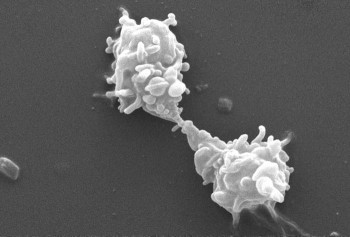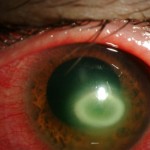
photo credit: Anna S. Kitzmann, M.D. Acanthamoebic keratitis is a horrific effect of improper care of contact lenses
It sounds like a classic urban myth, the sort of thing that would be shared wildly until counteracted by Snopes. However, Taiwanese undergraduate Lian Kao really has been blinded as a result of not changing her contact lenses.
The space between contact lenses and the eye is well suited to allowing microorganisms that don’t like oxygen to breed, and worse still, feed on the cornea. Acanthamoeba represents the main threat, and in Kao’s case six months of not removing her lenses gave it ample time to become established.

Acanthamoeba does not feed directly on human tissue. Instead it eats bacteria. Bacterial infections became established on Kao’s cornea, so the amoeba had plenty to eat to get a colony started. Then it burrowed into Kao’s eyes to get at the bacteria living further in.
Acanthamoebic keratitis, as the condition is called, can occur from not disinfecting contact lenses. Lens cleaners have been recalled after potentially exposing wearers to Acanthamoeba infections through failure to disinfect properly.
While lenses that haven’t been cleaned pose a risk, not taking them out at all is a far greater danger. Kao reportedly didn’t remove her lenses for six months, not only sleeping in them but swimming as well. Since swimming pools often contain Acanthamoeba this greatly heightened her risk.
Dr Wu Jian-Liang, director of opthalmology at Wan Fang Hospital said, “A shortage of oxygen can destroy the surface of the epithelial tissue, creating tiny wounds into which the bacteria can easily infect, spreading to the rest of the eye and providing a perfect breeding ground.”
Corneal transplants can sometimes repair the damage, but success is mixed mainly because it can be hard to get rid of the infection once it takes hold.
Acanthamoebic keratitis causes pain, eye redness and blurred vision, but surprisingly, the pain often does not become intense enough to cause people to seek help until the damage is already done. Washing hands prior to changing lenses is also an important line of defense.








 Photographer Finds Locations Of 1960s Postcards To See How They Look Today, And The Difference Is Unbelievable
Photographer Finds Locations Of 1960s Postcards To See How They Look Today, And The Difference Is Unbelievable  Hij zet 3 IKEA kastjes tegen elkaar aan en maakt dit voor zijn vrouw…Wat een gaaf resultaat!!
Hij zet 3 IKEA kastjes tegen elkaar aan en maakt dit voor zijn vrouw…Wat een gaaf resultaat!!  Scientists Discover 512-Year-Old Shark, Which Would Be The Oldest Living Vertebrate On The Planet
Scientists Discover 512-Year-Old Shark, Which Would Be The Oldest Living Vertebrate On The Planet  Hus til salg er kun 22 kvadratmeter – men vent til du ser det indvendigt
Hus til salg er kun 22 kvadratmeter – men vent til du ser det indvendigt  Superknepet – så blir snuskiga ugnsformen som ny igen!
Superknepet – så blir snuskiga ugnsformen som ny igen!  Meteorite That Recently Fell in Somalia Turns Out to Contain Two Minerals Never Before Seen on Earth
Meteorite That Recently Fell in Somalia Turns Out to Contain Two Minerals Never Before Seen on Earth  Nearly Frozen Waves Captured On Camera By Nantucket Photographer
Nearly Frozen Waves Captured On Camera By Nantucket Photographer  It’s Official: Astronomers Have Discovered another Earth
It’s Official: Astronomers Have Discovered another Earth 